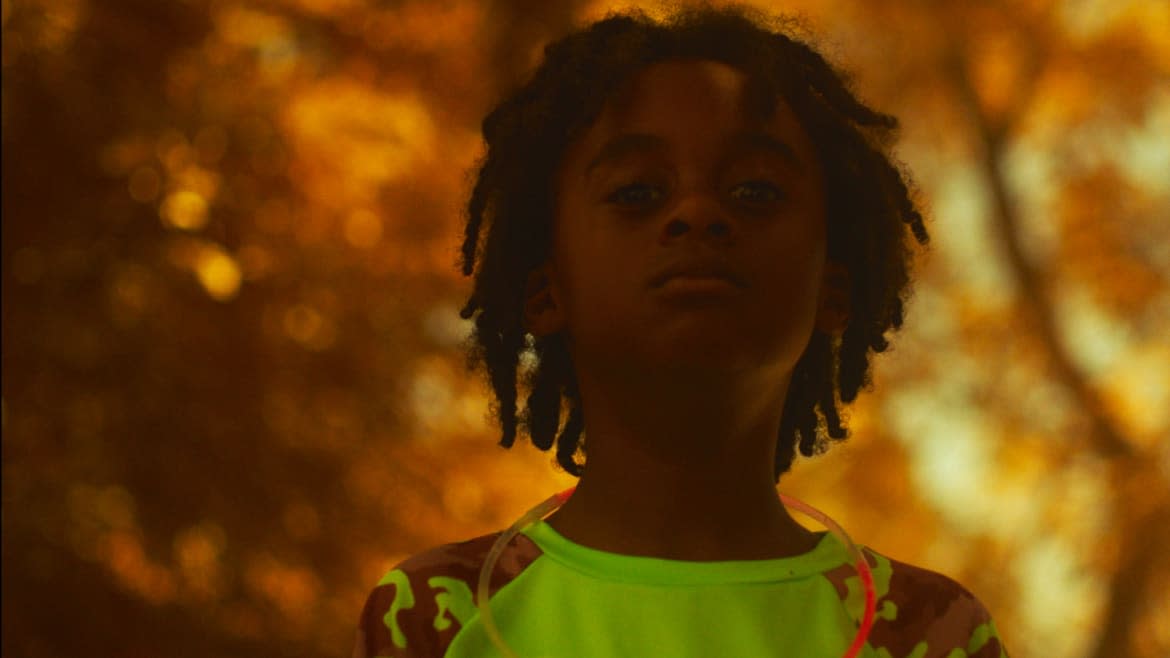‘Residue’ Shows the Human Toll of White Gentrifiers Invading Black Neighborhoods

Residue, the very personal feature film debut by Merawi Gerima, is patient but not slow. The film, which arrived this week to streaming platforms via Ava DuVernay’s distributor Array, sees past and present not only give clues about the future but inform a set of ideas and questions, telling a difficult story through many lenses and challenging the most obvious conclusions.
As many reviews have pointed out, the film is “about” gentrification in Washington, D.C. Jay (Obi Nwachukwu), who’s been away for years attending film school in Los Angeles, returns home to find his old neighborhood, Q Street, populated with affluent white people and his parents’ home, now elsewhere in the city, hounded by real estate investors looking to snatch it up. The story however, reaches beyond headlines and righteous statements, and instead searches for the substance of what actually goes on in places that do not merely change over time, but are violently transformed.
Not Just ICE: A California Prison Sterilized Her and Other Black Women
Jay can’t get ahold of an old friend, Demetrius, who none of the remaining locals will be straight with him about. His parents are well-situated, and own two properties including their old brownstone on Q Street where Jay is staying in an apartment, but Jay himself is deeply destabilized by what he’s come back to. The flashbacks that ensue in the meantime refuse nostalgia, and instead look frankly at the neighborhood before it was whitewashed—seeing its beauty as well as its terror on every inch of the block.
The residue that’s left is the few who are still hanging on in a heavily policed and speculated landscape. As they go about their fairly mundane daily business, Black locals work together to keep their young men alive and out of prison while dealing with both aggressive and benign intrusions from their new white neighbors, from a cheery-voiced threat to call the cops to an awkwardly insistent invite to a Fourth of July party. In the midst of it, Jay is hoping to write a screenplay about Q Street. He wants to “give a voice to the voiceless,” but a few of his old acquaintances, including the resentful Delonte (Dennis Lindsey), understand his project to be yet another form of exploitation. Jay may be from the place, but he’s no longer in it.
The history of gentrification is as long as it is complex, and yet so much media as of late has tried to boil it down to a question of cultural appropriation, or of turf. In fact, whether your neighborhood survives and whether you survive in it is a question of empire. The U.S. was constructed on the assertion that land-owning white men could claim any land they desired as theirs; for these gentry, it has never been a matter of joining a new community and partaking in a new way of life, but eradicating what was once there and then condemning it as it disappears. Presidents and politicians from nearly every administration have weaponized this history for their benefit, and at the expense of the many displaced people fighting for survival.
Still, like Gerima, Jay maintains an affective proximity to his old home; close contact with family, old friends, and a former lover bring us closer to the aloof budding filmmaker, who can’t seem to grasp how he has grown so estranged from his past life despite the fact that it was him who so eagerly left it behind. Gerima’s direction stages this emotional struggle as a negative—we don’t hear much dialogue, only the essentials; what’s left out is perhaps the spoken intimacies voyeurs crave, the pathos of pain, regret, and anger expressed by the vulnerable, beleaguered, and guilty. And yet traces of the old neighborhood remain—we see evidence of in the characters’ and camera’s movements, and in whispers.
Get our top stories in your inbox every day. Sign up now!
Daily Beast Membership: Beast Inside goes deeper on the stories that matter to you. Learn more.

